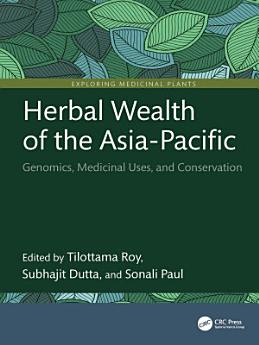Herbal Wealth of the Asia-Pacific: Genomics, Medicinal Uses, and Conservation
About this ebook
The Asia-Pacific region boasts an extraordinary variety of herbal plants, many of which are deeply rooted in medicinal practices and cultural traditions. Herbal Wealth of the Asia-Pacific: Genomics, Medicinal Uses, and Conservation examines the confluence of tradition, modern science, and conservation in preserving these botanical gems. By harnessing advanced genomic tools and investigating the therapeutic properties of herbal plants, this book connects ancient wisdom with modern scientific advancements. It offers an in-depth exploration of bioactive compounds, conservation challenges, and the practical applications of herbal plants throughout the region.
Key features of this book include the following:
• In-depth coverage and discussion of next-generation sequencing techniques, herb-genomics, and artificial intelligence (AI), for understanding and conserving medicinal plants
• Detailed analyses of pivotal medicinal plants, such as Nigella sativa, Mucuna pruriens, and colchicine-producing herbs, including their bioactive compounds, genetic diversity, and conservation approaches
• Comprehensive chapters detailing the application of herbal remedies in managing metabolic disorders, neurodegenerative diseases, and cancer, backed by evidence-based research
• Discussions on modern cultivation methods, sustainable harvesting practices, and the socioeconomic impacts of conservation efforts
• Explorations of innovative techniques like tissue culture, machine learning, and AI-driven conservation strategies
This book serves as an invaluable resource for researchers, students, and professionals in botany, pharmacology, conservation biology, and traditional medicine. Combining scientific precision with practical insights, it is equally beneficial for policymakers and community practitioners committed to safeguarding the herbal heritage of the Asia-Pacific region.
With contributions from passionate researchers and practitioners, this volume aims to meaningfully contribute to the ongoing dialogue on harmonizing traditional herbal practices with modern science to promote sustainable development and enhance global health.
About the author
Dr. Tilottama Roy is currently the interim Vice Provost and Assistant Vice President of Academic Affairs, Interim Dean of the Graduate School, as well as an Associate Professor in the department of Biology, at Missouri Western State University. Dr. Roy’s lab studies systematics and biogeography, understanding the patterns and processes involved in species diversification and radiation, particularly in plants. She teaches undergraduate courses in organismal biology, plant systematics, etc. She completed her BSc in Botany with honours from Presidency University in Kolkata, India, and then moved on to do an MS degree in Plant Evolution from the University of South Dakota in the US. Dr. Roy received her PhD in Ecology and Evolutionary Biology from the State University of New York, at Buffalo, NY. After that she pursued a postdoctoral fellowship at the University of Michigan, in Ann Arbor, MI. Dr. Roy is a member of the international scientific societies - Society for the Study of Evolution, Botanical Society of America, as well as serves on the executive board of the Society of Herbarium Curators. She also serves as the editor in chief of the biannual newsletter of the Society of Herbarium Curators – The Vasculum, as well in the editorial board of the peer reviewed Harvest journal. An avid animal lover, singer, and painter, she performs regularly in concerts as a member of the Saint Joseph Community Chorus, handcrafts her own jewellery, and volunteers in the local animal shelter.
Subhajit Dutta is a PhD Fellow at the Center for Functional Genomics & Tissue Plasticity (ATLAS) and the Functional Genomics and Metabolism (FGM) Research Unit, Department of Biochemistry and Molecular Biology, University of Southern Denmark (SDU). His research integrates computational and experimental biology, focusing on the functional genomics of macrophage plasticity in obesity and type 2 diabetes. His broader research interests include drug repositioning, obesity-associated metabolic disorders, healthy and unhealthy obese adipose tissue, network biology, cancer biology, and phytochemistry. Mr. Dutta earned his Bachelor’s and Master’s degrees in Botany with a specialization in Plant Genetics and Biotechnology from the University of Burdwan, India. He further honed his research skills in the field of obesity and type 2 diabetes as a Junior Research Fellow under a DST-SERB-sponsored project at the Department of Biotechnology, National Institute of Technology Durgapur, India. Before commencing his PhD, he served as a Research Assistant at SDU, Denmark. Mr. Dutta’s contributions to science are reflected in his peer-reviewed international journal publications and book chapters, which have garnered over 292 citations. To explore his work in detail, visit his ResearchGate profile at https://www.researchgate.net/profile/Subhajit-Dutta-11.
Dr. Sonali Paul is currently Professor, Department of Biotechnology, Institute of Engineering and Management, University of Engineering and Management, Kolkata. Having completed her graduate studies in Botany from Presidency College and Masters in Biochemistry from University of Calcutta she completed her doctoral degree from Department of Biochemistry, University of Calcutta. Her doctoral work focussed on the role of arsenic as a predisposing factor for blood cancer. She is associated with teaching students of Biotechnology for the past 14 years. Her present research interests include Environmental Toxicology, Environmental Biochemistry. She has published a number of papers in indexed journals of national and international repute as well has published patents to her credit. She has supervised several projects which deals with understanding heavy metal toxicity effects on varied ecosystem and devising methods for remediation. She is serving as an Assistant Editor of International journals and is a member of varied scientific societies.




